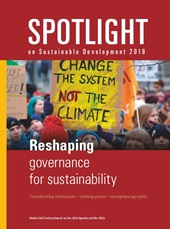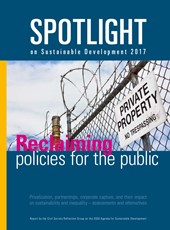Highlights

Policy responses to the COVID-19 pandemic and resulting economic crisis have greatly exacerbated national and global inequalities. Blatant examples are the unfair distribution of care work, relying mainly on women and poorly remunerated if at all, and the global disparity in the distribution of vaccines.
The dominant interests of rich countries, and corporate powers continue to dominate political decision-making. Given the urgency of the COVID-19 crisis and the other unresolved global problems, most notably the climate emergency, it is high time for transformative policies at all levels.
This is the key message of the Spotlight on Sustainable Development Report 2021. The report is launched on the first day of the Global Week to #ACT4SDGS by a global coalition of civil society organizations and trade unions.
|
|
The COVID-19 pandemic and the national responses to it brought the world almost to a complete lockdown. All over the world, States have intervened, to various degrees, to restrict the freedoms of their citizens in order to slow down the spread of the pandemic and prevent healthcare systems from collapsing.
What makes the situation even worse is that many countries were already confronted with massive social, ecological and economic problems before the crisis. These have not now disappeared. Climate change with its devastating consequences continues at a rapid pace; systemic racial and gender discrimination perpetuate inequality and injustice and undermine social cohesion; the increasing number of authoritarian regimes is a serious setback for human rights and the urgently needed socio-ecological transformation. The Spotlight Report 2020 unpacks various features and amplifiers of the COVID-19 emergency and its inter-linkages with other crises.
|

Independent monitoring and review of the implementation of the 2030 Agenda and its structural obstacles and challenges are key factors for the success of the SDGs.
The Spotlight Report 2019 report dives more deeply into the (global) governance arrangements and institutions that will be necessary to implement alternative policies and to unleash the transformative potential of the SDGs. It offers analysis and recommendations on how to strengthen inclusive and participatory governance and to overcome obstacles and gaps in the implementation of the 2030 Agenda and the SDGs. In doing this, it poses a strong call to action to world leaders just in advance of the SDG Summit in September 2019.
|

Independent monitoring and review of the implementation of the 2030 Agenda and its structural obstacles and challenges are key factors for the success of the SDGs. It is for this reason, the Reflection Group on the 2030 Agenda for Sustainable Development together with other civil society organizations and networks has produced the first annual Spotlight Report assessing the implementation of the 2030 Agenda and the structural obstacles in its realization. The report puts a spotlight on the fulfillment of the 17 goals, with a particular focus on inequalities, responsibility of the rich and powerful, means of implementation and systemic issues.
What are currently the main obstacles to achieving the SDGs? Are there transnational spill over effects that influence or even undermine the implementation of the goals? Are the current policy approaches, as they are reflected, inter alia, in the 2030 Agenda, an adequate response to the challenges and obstacles (or are they part of the problem)? What has to be done? Which specific policy changes (at international level) are necessary?
|
|
Published on Fri, 2011-02-18 13:23
» |
|
Published on Mon, 2010-07-12 13:23
La crise économique et financière mondiale récente a augmenté considérablement la crédibilité de l'ONU, la société civile et autres voix qui réclament une révision majeure dans les approches actuelles de la gouvernance économique. |
|
Published on Mon, 2010-07-12 13:16
Un rapport révèle des pratiques de travail infantile, salaires de misère et emplois temporaires |
|
Published on Mon, 2010-07-12 13:13
Dans la présentation du Rapport 2010 d'Amnistie Internationale : La situation des droits humains dans le monde, qui documente des abus dans 159 pays, l'organisation a affirmé que des gouvernements puissants bloquent les avances en justice internationale en agissant au-dessus de la loi en ce qui concerne les droits humains, en protégeant ses alliés face aux critiques, et en prenant des mesures seulement quand cela leur convient politiquement. |
|
Published on Tue, 2010-03-09 13:58
Février
Mars |
|
Published on Mon, 2010-01-18 17:44
SW a approuvé son Document Stratégique et a choisi son nouveau Comité Coordinateur, entre autres réalisations de l'Assemblée Générale tenue en octobre dernier à Accra, Ghana. |

